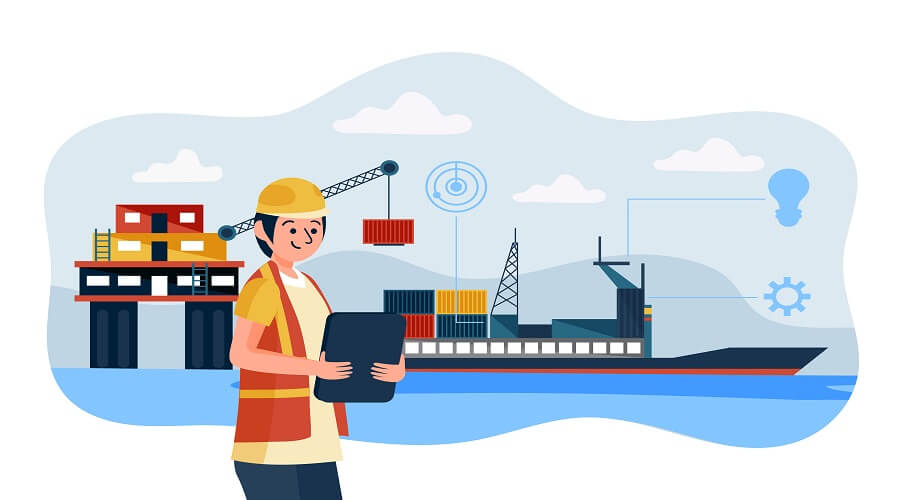How many jobs are available in marine transportation? This is a question that many people have, and it’s easy to see why. The maritime industry is thriving, and there are numerous opportunities for those who want to work in it. This article will go over the various types of jobs available in marine transportation, as well as the training and education requirements for each. So, if you’re looking for an exciting career, keep reading or take a look at how many jobs are available in marine transportation!
Marine transportation is a thriving industry with numerous job opportunities. Deckhands to captains are all part of the marine transportation industry. If you have the necessary qualifications and many opportunities for advancement, it can be a great career choice.
This guide will discuss the availability of jobs as well as all important aspects of pursuing a career in marine transportation.
What Exactly Is Marine Transportation?
The process of transporting goods and people by water is known as marine transportation. This can be accomplished using ships, barges, ferries, and other types of watercraft. Marine transportation is an important part of the global economy because it allows goods and people to move between countries and continents.
Using marine transportation has numerous advantages. It is frequently faster than land-based methods like trains or trucks. It is also typically more fuel-efficient than air travel. Marine transportation is also more secure than other modes of transportation.
Despite these benefits, marine transportation has some drawbacks. One major disadvantage is that it can be more expensive than other modes of transportation. Furthermore, weather conditions can cause delays or even cancellations in marine transportation.
Also Read: What Companies Are in The Consumer Services Field in the USA?
Overall, marine transportation is a secure, efficient, and cost-effective method of transporting goods and people around the world. It is an essential component of the global economy and will continue to play an important role in the coming years.
Marine Transportation in the United States
With over 95,000 miles of coastline and over 30,000 miles of navigable inland waterways, the United States is a maritime nation. Marine transportation helps our economy by transporting goods to and from U.S. ports, including those in Alaska and Hawaii, as well as transporting passengers between our coastal communities and beyond.
Marine transportation is an important component of the United States transportation system, and the Coast Guard is in charge of ensuring its safety and security. The Coast Guard keeps our waterways safe by inspecting vessels for safety compliance, investigating marine incidents, and patrolling our coasts to deter illegal activity.
There are numerous job opportunities in the marine transportation industry. The United States Coast Guard is in charge of ensuring maritime traffic safety, but there are also numerous jobs available with private shipping companies. Mariners with the necessary licenses can find work on cargo ships, passenger ships, and tugs and towboats. There are also numerous career options in naval architecture and marine engineering.
How Many Jobs are Available in Marine Transportation?
The maritime transportation industry is critical to the global economy because it is responsible for the movement of both goods and people around the world. As of September 2023, there are over 8,400 open positions in the maritime transportation sector. The sector as a whole is rapidly developing as a result of the rising demand for marine services.
Those who want to work in the maritime transportation industry will find a wide range of job opportunities.
What Are the Career Opportunities in Marine Transportation?
There are numerous job opportunities in marine transportation. Deckhands, engineers, and captains are among the jobs available. Deckhands assist in keeping the ship clean and perform other duties on deck. Engineers are responsible for the operation of the ship’s engines and other machinery. Captains are in charge of ensuring the ship’s safety. Let’s find out more about these roles.
Pilot
In the marine transportation industry, various pilot roles are required for a vessel’s safe and efficient operation. Some pilots are in charge of guiding ships into and out of ports, while others are in charge of navigating ships through dangerous or congested waters. Pilots must be well-versed in the waterways they navigate and be able to make quick decisions in order to keep vessels safe. They are also important in preventing accidents and pollution.
Maritime Attorney
Maritime lawyers play an important role in ensuring the safety of those who work on and use the waterway in the marine transportation industry. Maritime law is a vast and ever-changing body of law that governs all aspects of maritime activity. From admiralty law to contract disputes, maritime lawyers must have a thorough understanding of this specialized area of law in order to effectively represent their clients.
Also Read: How Many Jobs are Available in Telecommunications Equipment in the USA?
Maritime lawyers represent a wide range of clients, including ship owners, operators, and crew members. They may also represent the interests of passengers or cargo in maritime accidents or other incidents and disputes. To protect their client’s interests, maritime lawyers must be able to think on their feet and make quick decisions. They must also be able to communicate effectively with people from all walks of life, including those with little legal knowledge.
Captain of the ship
The maritime transportation industry is in charge of shipping goods and passengers all over the world. Ship captains are at the forefront of an industry that is critical to the global economy. The responsibilities of a ship captain include overseeing all aspects of a voyage, from planning and preparation to execution and follow-up. In addition to their operational responsibilities, ship captains must follow regulations established by governing bodies such as the International Maritime Organization (IMO).
Deck Attendant
Deckhands play an important role in the marine transportation industry. Deckhands are in charge of unloading and loading cargo onto and from ships in a safe and efficient manner. They must be able to work quickly and accurately under pressure, often in hazardous and difficult conditions. Deckhands must be physically fit, capable of lifting heavy objects, and have a high level of stamina. They must also be knowledgeable about the types of cargo they are handling as well as the proper handling procedures.
Engineer
Engineers in the marine transportation industry are in charge of designing, developing, and operating ships and other watercraft. To keep ships moving safely and efficiently, they must be able to think critically and solve problems.
In this field, engineering roles range from naval architects who design ships to marine engineers who work on engines and propulsion systems. Some engineers specialize in areas such as safety, navigation, or cargo handling. Whatever their specialty, all engineers in the marine transportation industry must be well-versed in fluid mechanics, shipbuilding principles, and maritime law.
How Do I Break Into The Marine Transportation Industry?
If you’re looking for a job that will keep you on the move all the time, a career in maritime transportation might be just what you’re looking for. This industry offers a wide range of occupations, from pilots and captains to deckhands and engineers. But how does one get hired by one of these maritime companies? Continue reading to find out.
For entry-level positions in the maritime transportation industry, a high school diploma or its equivalent is frequently required. Certain jobs, on the other hand, may necessitate a higher level of education or experience. Pilots, for example, must have a bachelor’s degree in marine science or engineering, whereas captains must have many years of experience steering commercial vessels.
Also Read: How to Get a Government Job in Singapore
As soon as you have received your high school diploma (or the equivalent) and are ready, you should start looking for work in the marine industry. You can find available jobs by contacting local shipping companies or searching on internet job sites.
Is a Career in Marine Transportation a Good Choice?
Marine transportation is a great career path for those who enjoy the water and want a fast-paced job. There are numerous marine transportation jobs available, ranging from ferry driver to captain of a large ship. Marine transportation is a growing industry with numerous opportunities for advancement. Consider a career in marine transportation if you want a challenging and rewarding job.
It is estimated that 90% of the items traded globally are transported by water, making maritime transportation a significant economic sector. Even if the extent of your influence on international business is difficult to comprehend, your daily impact will be obvious.
How Do I Get a Job in Marine Transportation?
If you want to work in a fast-paced environment, marine transportation might be the job for you. There are numerous jobs available in this field, ranging from captains and pilots to deckhands and engineers. But how do you become one of these seafarers? Continue reading to find out.
The majority of marine transportation jobs require a high school diploma or equivalent. Some positions, however, may necessitate additional education or experience. Pilots, for example, must have a bachelor’s degree in marine science or engineering, whereas captains must have several years of sailing experience.
It’s time to start looking for a job in the maritime industry after you’ve graduated from high school (or obtained your equivalency). To inquire about open positions, you can search online job boards or visit local shipping companies. For job opportunities, visit the International Maritime Organization.
Prospects for a Marine Transportation Worker
The future for a marine transportation worker appears bright. According to the Bureau of Labor Statistics (BLS), employment for water transportation workers is expected to grow by 12% between 2016 and 2026, faster than the average for all occupations.
Jobs in this occupation are frequently located in coastal areas and can be dangerous, so individuals interested in this field should be prepared for long hours and hazardous working conditions, according to the BLS.
What Should I Know Before Pursuing a Career in Marine Transportation?
There are numerous transportation careers available, but one that is frequently overlooked is marine transportation. It can be a rewarding career for those who enjoy being on the water and working with boats. Many factors must be considered before pursuing a career in marine transportation, such as the necessary skills and what it takes to succeed in the field.
Making the decision to pursue a career in marine transportation can be difficult, especially if you lack all of the necessary information. Here are some facts to consider before making a decision.
Also Read: 22 Best Job Websites in the United Kingdom
Take some time to consider what you want first. What are your objectives, and what do you hope to gain from this decision? It will be easier to find the right solution once you know what you want.
Second, collect as much information as you can. This includes conducting research and speaking with marine transportation experts. The more data you have, the more informed your decision will be.
Third, based on your interest, weigh the pros and cons of each role. This can assist you in determining which role is best for you.
Finally, don’t be afraid to seek assistance. If you’re undecided about pursuing a career in marine transportation, talking to someone else can often help clear things up.
How Many Job Opportunities Are There in the Marine Transportation Industry?
The marine transportation industry is an important part of the global economy, transporting goods and people all over the world. More than 8,400 jobs are available in the marine transportation industry as of October 2023. The industry is rapidly expanding as a result of the rising demand for maritime services. If you want to work in the marine transportation industry, you have a lot of options.
Worker in Marine Transportation in the Future
The maritime industry has a long and proud history of providing efficient and dependable global transportation of goods. The workers who operate and maintain the ships that make this possible are critical to the industry’s success, and their future looks promising. Technological advancements have made marine transportation more efficient than ever before, and there is an increasing demand for these workers. The future looks bright for marine transportation workers, thanks to a strong economy and a demand for efficient transportation.
A Marine Transportation Worker’s Salary and Benefits
The average annual salary for a marine transportation worker is $62,760. The majority of these workers are employed by merchant marines and are in charge of the safe and efficient transportation of goods and people by water. The work can be dangerous and difficult, but it is also extremely rewarding. The marine transportation worker is in charge of ensuring the safe operation of various vessels such as cargo ships, tankers, passenger ferries, and cruise ships. They must be well-versed in navigation, weather conditions, and maritime law.
Training and Education Required to Work in Marine Transportation
Becoming a Marine Transportation Worker necessitates extensive training and education. To work on vessels operating in US waters, mariners must be licensed by the US Coast Guard. There are numerous types of licenses, each with its own set of requirements.
Also Read: How to Find the Highest-Paying Part-Time Jobs in Australia
Completing an approved maritime academy program is the most common path to becoming a licensed mariner. These programs are typically four years long and lead to a degree in marine transportation or a related field. Some academies also offer shorter certificate programs for those with prior maritime experience.
Marine Transportation Industry Difficulties
The marine transportation industry is confronted with numerous challenges, including a constantly changing regulatory environment, increased competition, and rising operating costs. For the industry to thrive in the face of these challenges, innovative solutions and strong leadership are required. The following are some of the most common challenges in the marine transportation industry:
Environmental Implications
The environmental impact of maritime shipping is one of the most significant challenges. Large cargo ships, for example, can emit significant amounts of air pollution, including greenhouse gases. Maritime shipping also pollutes the environment and threatens marine life.
Life Danger
One of the most difficult challenges confronting the marine transportation industry is the risk of injury or death. Maritime workers face a variety of hazards, including drowning, falls, and collisions.
The maritime industry is one of the world’s most dangerous, with accidents that can have devastating environmental consequences, such as oil spills and contamination. To reduce these risks, businesses must prioritize safety and implement strict regulations and procedures.
Family Disengagement
Another challenge for maritime workers is the requirement to be away from family for extended periods of time. Maritime workers are frequently required to spend months away from home, which can be difficult for families.
This is especially true for seafarers with small children. It can be difficult for parents to be away from their children for extended periods of time, and it can be difficult for children to adjust to having a parent away for extended periods of time.
Financial Danger
Profitability in the marine transportation industry is affected by market fluctuations such as fuel prices and global economic conditions. To mitigate these risks, businesses must closely monitor market trends and make strategic financial decisions.
Boredom
Another issue that maritime workers face is boredom. Many maritime jobs are monotonous and repetitive. This boredom can result in a variety of issues, including fatigue, mistakes, and accidents.
To avoid boredom, maritime workers must find ways to keep themselves engaged in their work. This can include figuring out how to make their work more interesting, such as by varying their tasks.
Conclusion – How Many Jobs Are Available in Marine Transportation?
Millions of people are employed in the maritime industry, which supports many more jobs in related industries. There are numerous opportunities available if you want to work in marine transportation.
Also Read: Online Data Entry Jobs Without Investment: Top 25 Popular List Updated
You could be working on a ship, in a port, or for a maritime company in no time if you have the right training and experience. It is best to conduct research and prepare for the marine transportation job you are applying for!
How Many Jobs are Available in Marine Transportation – FAQs
In 2023, how many ships will be in the world?
According to the International Chamber of Shipping, there will be over 50,000 merchant ships in the oceans by 2023. This figure is expected to rise in the coming years as global trade expands. The growing global economy can be attributed to the increase in maritime traffic. The demand for ships to transport goods grows as more countries trade.
Is a Career in Marine Transportation a Good Choice?
Yes, marine transportation is a viable career option for those who enjoy working on the water. You can expect competitive pay and plenty of opportunities for advancement as a marine transportation professional. Aside from the financial benefits, you will have the opportunity to work in a variety of environments, including ports, harbors, rivers, lakes, and oceans.
This dynamic job provides opportunities for continuous growth and exciting challenges. Consider a career in marine transportation if you want to join a growing industry with numerous opportunities for success.
Are Maritime Positions in High Demand?
Yes, maritime jobs are in high demand due to the global economy’s continued growth and the need for efficient goods transportation. This demand is only expected to grow in the coming years, making maritime careers an excellent choice for those seeking stable, well-paying employment.
What exactly does a Transportation Specialist do?
My company’s transportation specialist is in charge of planning and organizing all aspects of transportation. Determining the most efficient and cost-effective modes of transportation, coordinating schedules and routes, managing shipping documentation, and ensuring the safe arrival of goods or individuals are all part of the job.
Browse More Jobs |
Visit Now |
Careercartz Home Page |
Visit Now |
Jobs By Location
- HDFC Future Bankers Recruitment 2024 Latest Private Job Opportunities - 15/04/2024
- The Benefits of Working in Government Legal Jobs - 24/02/2024
- Top Highest Paying Bank Jobs in Hyderabad - 22/02/2024




